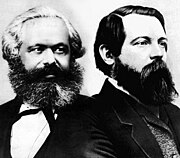Althusser's earlier works include the influential volume Reading Capital (1965), which collects the work of Althusser and his students in an intensive philosophical rereading of Karl Marx's Capital. The book reflects on the philosophical status of Marxist theory as "critique of political economy", and on its object. The current English edition of this work includes only the essays of Althusser and Étienne Balibar,[5] while the original French edition contains additional contributions from Jacques Rancière, Pierre Macherey, and Roger Establet.
Several of Althusser's theoretical positions have remained influential in Marxist philosophy. The introduction to his collection For Marx proposes a great "epistemological break" between Marx's early writings (1840–45) and his later, properly Marxist texts,[6] borrowing a term from the philosopher of scienceGaston Bachelard.[7] His essay "Marxism and Humanism" is a strong statement of anti-humanism in Marxist theory, condemning ideas like "human potential" and "species-being", which are often put forth by Marxists, as outgrowths of a bourgeois ideology of "humanity".[8] His essay "Contradiction and Overdetermination" borrows the concept of overdetermination from psychoanalysis, in order to replace the idea of "contradiction" with a more complex model of multiple causality in political situations[9] (an idea closely related to Antonio Gramsci's concept of cultural hegemony.)[10]
Althusser is also widely known as a theorist of ideology. His best-known essay, "Ideology and Ideological State Apparatuses: Notes Toward an Investigation",[11] establishes the concept of ideology. Althusser's theory of ideology draws on Marx and Gramsci, but also on Freud's and Lacan'spsychological concepts of the unconscious and mirror-phase respectively, and describes the structures and systems that enable the concept of the self. These structures, for Althusser, are both agents of repression and inevitable: it is impossible to escape ideology and avoid being subjected to it. On the other hand, the collection of essays from which "Ideology and Ideological State Apparatuses" is drawn[12] contains other essays which confirm that Althusser's concept of ideology is broadly consistent with the classic Marxist theory of class struggle.
Althusser's thought evolved during his lifetime. It has been the subject of argument and debate, especially within Marxism and specifically concerning his theory of knowledge (epistemology).
| Marxism |
|---|
 |



